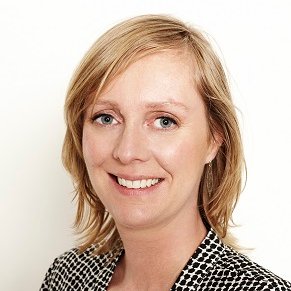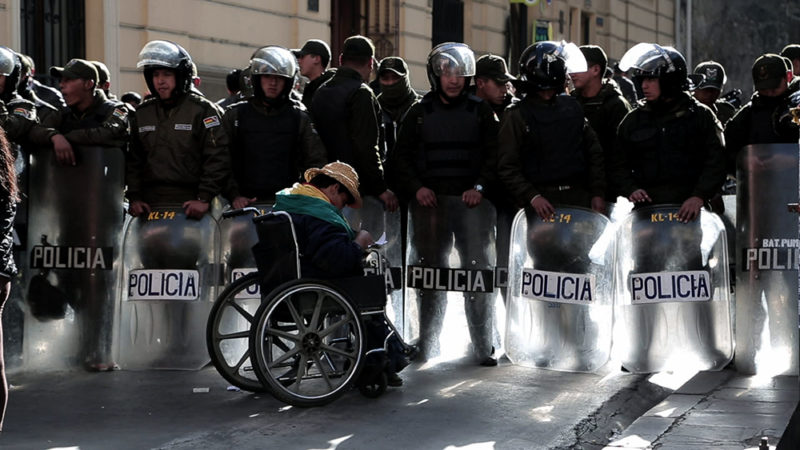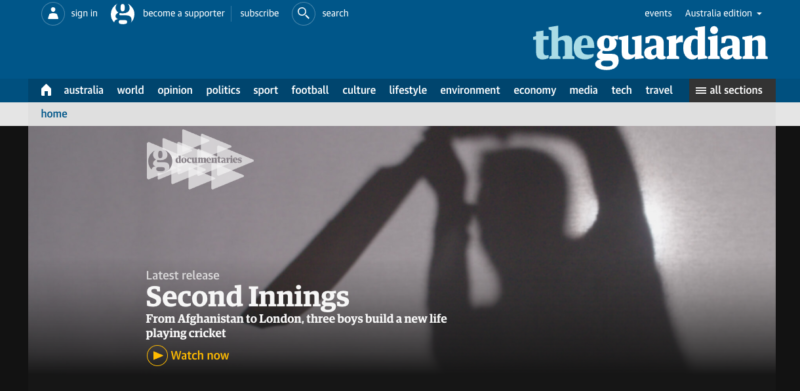Why the Guardian is investing in Australian documentaries
Three weeks ago, Screen Australia and the Guardian locked in an agreement to commission and distribute three local online documentaries. Mumbrella's Zoe Samios chats with the Guardian's Charlie Phillips and Screen Australia's Alyssa Orvis about the project, and the Guardian's love for Australian talent.
The Guardian’s head of documentaries Charlie Phillips has always had a love for Australian documentaries, so it shouldn’t have come as a surprise when Screen Australia and the Guardian locked in an agreement to commission three Australian-made online documentaries.
As part of the agreement, the Guardian and Screen Australia will provide a funding pool of up to $126,500, with the publishers contributing a fixed amount of $36,500 and Screen Australia providing between $36,500 and $90,000.
Each documentary will provide new perspectives on important global contemporary stories, and will run across the Guardian in Australia, the UK, the US and other international sites.
While Phillips had previously commissioned local documentaries such as The Island and The Fight, he says the start of a relationship between Screen Australia and the Guardian presented greater opportunities – bigger audiences, new voices, and great stories.
“Ever since I started I’d been having on off conversations with Screen Australia about how we could support the talent they work with, to bring them into the Guardian world, and they were very excited about the online space and short documentary space,” Phillips tells Mumbrella.
While he already knew some filmmakers, a visit to Australia got him chatting with Screen Australia, leaving him “blown away” by the range of stories people were working with.
“It is quite rare to go somewhere and think ‘oh my god there are so many stories bubbling up here that I just haven’t really seen pitched to me and that I don’t really know anything about. And that’s kind of a goldmine really.”
For Alyssa Orvis, investment and development manager, documentary at Screen Australia, the initiative was about providing new opportunities for local filmmakers, and was a “natural fit”.
“Australians do have a really unique perspective on the world. There’s a lot of Australians that travel internationally, there’s been some really great Australian documentaries that have resonated internationally recently,” she adds.
“We want to be able to support a really diverse range of filmmakers at different stages of their career.”
According to Orvis, the conditions for entry have been kept low – with the requirement only one documentary – to allow early career filmmakers to be eligible for the opportunity.
With the new local agreement, Phillips will look for stories which have been kept “underground”, which fit in with the Guardian’s editorial line.
The online documentaries are required to be 20 minutes, with an unfolding narrative and strong characters.
“The fact it is online tends to attract a lot of newer voices and so I’m really hoping it’ll be an opportunity to showcase some new Australian documentary voices who may have not been seen by many people outside of the country, or many people within the country,” he adds.
“We also enter our films to lots of festivals, sometimes the films will end up going out on TV or other online platforms because other opportunities come up that are really great for the films to get exposed.
“At the moment we are experimenting with holding back releasing the films on the Guardian to get them a really good world premiere at a festival. We won’t do that with every film, but it’s possible with the right kind of film.”
As part of the partnership, Phillips says he will help filmmakers understand the online documentary space, and be involved in shaping the films.
“It’s about doing a different form of storytelling but it’s also about bringing different voices into the Guardian as well, so we’ve obviously got great in-house journalists, but it’s a different kind way of looking at things that documentary makers bring, and it’s exciting to bring in these independent voices, who are trustworthy and really skilled.
“They kind of say things in a different way to the way a Guardian journalist would,” he explains.
However, he adds: “There are a lot people that can make a beautiful 20 minute film that’s going to be a perfect festival film… but it’s not necessarily going to speak to an online audience.
“We need to make sure that all our filmmakers are upholding the highest editorial and legal standards.”
For those projects selected, the funding will aim to cover the film’s productions costs, but the amount from Screen Australia is subject to how long the film is, and the nature of the project.
There will also be a three year exclusivity agreement.
Phillips says allowing others to use the film would be “detrimental” to the getting the film seen.
“Because we are a very big global platform and people come to our sites from all over the world, it just doesn’t really work practically to do anything other than that initial exclusivity.
“It’s definitely good if the films are seen by lots of people, and in the way that’s sort of the most easy and blunt measure, it’s to look at the viewing figures.
“For me, it’s also really important that the films are really good, and they are telling really great new stories, and are showcasing new talent, and they’re enhancing the Guardian’s reputation for being a home for documentaries.”
Orvis is not worried about the exclusivity agreement: “I don’t think there should be a massive amount of concern because I think we’ve been transparent about it.
“The Guardian is very open to film festival premieres during that time, but in terms of existing online you can totally understand why they want that to be exclusive because it’s going to be branded as a Guardian documentary, and it is going to be born out of the initiative.”
On measuring the initiative’s success, Phillips says the focus is on building audiences for the documentaries.
“Obviously our commercial team are always finding other ways of monetising off the back of them but that’s something that is emerging but at the moment my priority, especially because I’m on the editorial side, is getting really good work,” Phillips says.
“Documentaries don’t get massive viewing figures and so I feel like my mission and the thing I try and make filmmakers excited about is the Guardian is one of the most visited websites in the world and this is an opportunity to be showcased.”
The deadline for funding applications is 3 November 2017, with successful applicants to be announced in February 2018.
This year’s Publish Conference will include a session featuring Guardian Australia’s CEO, Ian McClelland. To find out more and buy tickets, click here.








